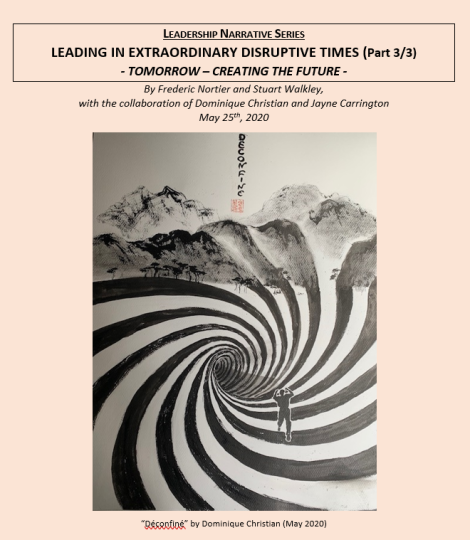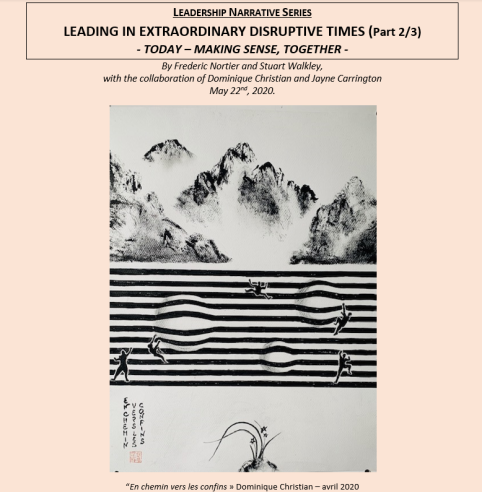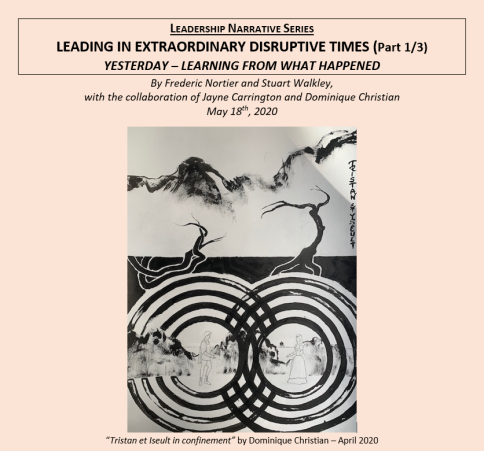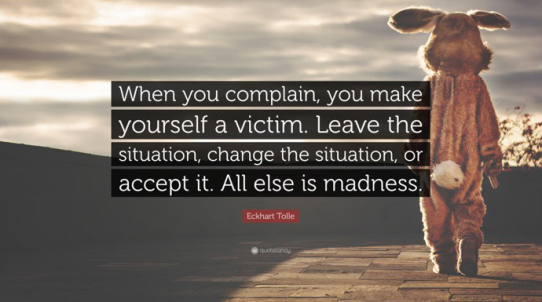BEWARE!
Entering this section, reading its publications, or discovering the proposed links, may modify your perspective, your vision and consideration about so called “realities” or “common ways of presenting ideas”.
Our worlds are rich, dense, evolving, and immensely diverse. Let's prevent ourselves from the easy mono-dimension interpretations of realities. In our own quest of finding new angles to learn/unlearn/discover, we hope this section will provide you insights, questions, “mental twitches”, disruptive ideas, and freshness to build your own solutions.
We will value your reactions … let it be a space to share and debate …
LEADERSHIP NARRATIVE SERIES
This is the second part of our work, called:
LEADING IN EXTRAORDINARY DISRUPTIVE TIMES (Part 3/3)
TOMORROW – CREATING THE FUTURE
May 25th, 2020 - By Frederic Nortier and Stuart Walkley, with the collaboration Dominique Christian and Jayne Carrington
In this third and last paper, focusing on the “now what?” element of reflective learning, we are exploring a number of themes which assist leaders to enact the future differently with the aim of shaping sensemaking in the “after” world.
>> Download PDF
LEADERSHIP NARRATIVE SERIES - Tomorrow -[...]
Document Adobe Acrobat [918.5 KB]
This is the second part of our work, called:
LEADING IN EXTRAORDINARY DISRUPTIVE TIMES (Part 2/3) - TODAY – MAKING SENSE, TOGETHER
May 22nd, 2020 - By Frederic Nortier and Stuart Walkley, with the collaboration of Dominique Christian and Jayne Carrington
In this second paper, focusing on the “so what?” element of reflective learning, we are developing among many things the importance of building a leadership narrative in these times.
As many of you know, we have been working with leaders and organizations for many years in using very sharp and specific strategic narration, leadership narratives and narrative coaching approaches.
>> Download PDF
LEADERSHIP NARRATIVE SERIES Part 2- Toda[...]
Document Adobe Acrobat [1.0 MB]
LEADING IN EXTRAORDINARY DISRUPTIVE TIMES (Part 1/3)
YESTERDAY – LEARNING FROM WHAT HAPPENED
Under Explhore’s Think-Tank initiative, we met virtually and collectivelly to write this series of three leadership narratives from end of April to the 15th of May 2020. It was a great joy of collaborating and finding ourselves drawn to co-creating these articles, drawing not only from our own resources but from all the great inspiring leaders and experts with whom we are connected across the world. Our aim is to bring a deep and practical perspective to leaders.
>> Download PDF
LEADERSHIP NARRATIVE SERIES Yesterday - [...]
Document Adobe Acrobat [1.1 MB]
LEADING IN EXTRAORDINARY TIMES
.
This document is a summary of some key client meetings, webinars and coaching sessions, that took place virtually between March and April 2020, during the Covid19 pandemic.
THE VALUE OF COMPLAINT FREE THINKING IN CRISIS TIMES
Many of you, working and interacting withExplHore, are aware of work with the International Committee of the Red Cross (ICRC).
A few days ago, in a narrative coaching session with one of our coachees, of African origin, shared this quote from Eckhart Tolle.
Our client has been exposed to wars, has been displaced in his country, and has known the refugee experience.
We strongly believe in the value of this message, more than even in disruptive and crisis times.
We would like to address more particularly this is a message to all those who believe they are “mobilised” in the crisis by bringing all their energy and focus in criticizing, in complaining, in judging, in denigrating initiatives to address a disruptive crisis…. These are not effective responses and are counterproductive. Let’s be self-aware that the Covid19 pandemic is exposing us to a unique and never experienced situation in our global contemporary world.
We believe in the value of putting our energy and focus in helping, in accompanying (even clumsily), in encouraging, in inventing the world of the “after”. In other terms, let’s be actors at our level.
OBSERVING, QUESTIONING, LEARNING ... IN A COVID19 CRISIS CONTEXT
The danger of cognitive bias linked to the fast obsolescence of knowledge
The covid19 is both anxiogenic and fascinating. It reveals, in an accelerated manner, some cognitive and psychological processes. In normal times, what allows us to understand and to shape valid mental representations is built over the long term. The covid19 pandemic is deeply impacting this mental process, as it forces this process to be a short term one, or even a very short term one. Most of our ways of reading and decoding are impacted.
Take a moment to ask yourself the following questions about the Covid19 and its implications:
Photo by Ehimetalor Akhere Unuabona
The current situation takes us to process an incredible high volume of external information, all of it permanently evolving. In front of this crisis, our individual experience, both unique and dynamic, pushes us, whether we like it or not, to have an ongoing cognitive process of readjustment of our thinking schemes, of our understanding, of our ways of projecting the future, and of our decisions, … and all this at unusual and amazing fast pace. Let’s be mindful about it, let’s be humble and respectful in our statements and in our acts.
We are experiencing an intense « let it go » moment, non-chosen, but salutary. This is certainly true for each of us. Consequently, we have to acknowledge and accept that this is also the case for all experts, scientists, doctors, leaders and politicians… so many things we know today about the Covid19 pandemic were unknown a few days ago.
As executive coaches, the ability to self-reflect and to work on ourselves, is an ongoing discipline and requirement. Should it be for our own sake, or in our way of accompanying a leader, a team or an organisation, the working and reflecting angles are centred around: Learning to observe, Self-questioning, Self-awareness and mindfulness, ability to question what we used to take for granted yesterday. This is absolutely key and critical while handling and managing a crisis like the one humanity is facing.
The one who is being resistant to engage into such thinking, will progressively get locked and get trapped by the anachronisms he/she is creating and spreading, most of the time unconsciously. In a crisis context, like the Covid19 one, each statement, each point of view, each fact presented, is highly volatile and quickly obsolete … and therefore generates new sources of anachronism.
Our clients are currently facing an amazing and complex cocktail of personal, social, organisational pressure, asking them to act… they are caught by the WHAT to focus on (the what to do, the what to say, the what to decide). But the very evolutive nature of the crisis increases the pace of obsolescence of the answers to the WHAT. Our job, as professional coaches accompanying others in crisis management, has a lot to do with helping our clients to also identify, observe, analyse, reframe and guide the HOW a crisis is addressed, managed and lead. It is about helping people and collectives to also consider and question the HOW they function in such situations, in order to shape together (though collective intelligence) the HOW they wish to function in their context, in full consideration of their stakes, diversity, own sources of stress and fears, needs, assets…
It may seem simple at a first look. It is not. Once in a situation, many are those who feel being in a WHAT dead-end and get stuck in the crisis.
It is a daily inspiration for us to be able to help our clients in finding their levers to unlock and unleash their human potential to bounce back, to learn, to reinvent themselves and shape their resilience.
About CHANGE ACCELERATION
Mainstream thinking:
It has become a common view, almost an unquestionable one to declare that the pace of change is accelerating, and that there is no other choice than to adapt. A Darwinist approach leading
people and organizations to look at the world as an ever changing one, forcing them in return to be in an ever changing mode, if they do not want to disappear. A view, no organization or
person can escape from.
There is some truth about the perception of acceleration regarding what may interfere, impact, modify or act on what “is”.
However is this truly new? During the Age of Enlightenment, or the industrial revolution, as well the 20th century, most of what was considered then as an unquestionable given has been reconsidered. Worlds of new realities came to life, generating infinite options, leading to reinvent societies, roles, organizations, traditions, rituals and practices. Entire realities vanished during these times, while new ones emerged.
A western citizen in the 1900’s, in 1930’s, in the 1950’s, or in the 1970’s was exposed to numerous changes at geopolitical, social, economic, ideological, technology, educational as well as job levels. Elsewhere, in Amazonian Indian societies, every day is about facing the unpredictable changes from the rainforest. And what about those people living in war or post conflict zones, where every day is an open door to the unknown, to permanent adaptation and to profound transformations.
So what is truly different today?
Probably, one aspect is the entry into postmodernity which has deeply changed our individual approaches to existence. The postmodern citizen has become genuinely self-centered although connected, and therefore mostly concerned but what happens to him/herself. As a reinforcement dynamic, with postmodernity the western world has developed a dynamic through which our entire societies focus on the here & now, the instant flux of information, with a decreasing importance given to broader timeframe perceptions or the overall historical backgrounds & contexts.
To this first element of response, a second dimension is most certainly the unlimited access, most often instant access, to news, to novelty and to information. This pace has been continuously increasing, and with it people and organizations have become overwhelmed by data impacting their realities and by potential choices to be made.
The downside of a postmodern self-centered approach, disconnected from a historical view or roots, combined with a here & now focus, and with unlimited instant access to information, decreases logically individuals’ ability of discernment.
But no new information equals a need for change. Information needs first to be processed. An adaptation to a “new reality”, may at first seem as the only option, if not the right social behavior to display, but may end up being a regression compared to what “is”.
Therefore, when facing a new reality, or a new information, decisions may be taken, changes initiated, transformation processes activated …
… or not!
Transformational thought: ... in those situations ... Are we reacting? Or are we giving ourselves the permission to choose?
About COLLECTIVE INTELLIGENCE
Mainstream thinking:
“Collective intelligence” is becoming the new “it”. A growing number of corporate organizations & senior leaders, when not universities, looking for growth, effectiveness, optimization
or talent retention levers, emphasize the virtues of collective intelligence, and present it as THE relevant management response to our contemporary world. Books, classrooms, moocs,
conferences and workshops arise everywhere, to offer the process that will take benefit from collective intelligence.
“Developing collective intelligence in the corporate world”: What a paradoxical approach and belief! A contradiction in terms?
Most experts agree about what main factors are required to get the proper conditions for collective intelligence, factors already described more than twenty years ago in the theory of complex adaptive systems:
An information limited locally and in quantity;
A human system led by few and simple rules;
An abundance of multiple social interactions;
An emerging structure seen as useful by the collective community.
They also agree that having these factors cannot ensure the emergence of collective intelligence. Swarms of birds or fishes are good illustrations of collective intelligence in nature. Can organizations obtain similar swarm dynamics? How many organization are able to welcome and accept the factor “emerging structure” seen as useful by the collective community”?
Therefore, one can only smile when listening to those who teach how to “manage the collective intelligence” in their organization.
Most organizations have followed the routes of globally designed structures, with clear when not strict job descriptions, decisions matrixes, planning execution, KPIs, …. All being control factors working against emerging collaboration and collective intelligence. Collective intelligence cannot be the result of any top down decision or pre-defined processes.
Communities demonstrating collective intelligence know how to take care of their community members, in the short and in the long term, and also provide respect and considerations for the values supporting the social interactions. These communities not only focus on the “tangible”, but also on the symbolic dimension of what may constitute the community. Most often, they also have rituals that nurture the collective intelligence, as well as the collective awareness.
Are corporate organizations ready to reconsider their DNA, to let go their control appetite, and to take the time to observe, to welcome and to nurture what is emerging from their collective mind, instead of deciding “how it should like”?
Transformational thought:… how do we … welcome and contribute to what is sense-making for the collective mind, beyond our own individual needs?
About TALENT MISMATCH
Mainstream thinking:
In today’s global world, the skills mismatch will intensify as pressure to find the right skills in the right place at the right time will increase as working age populations decline, economies rebound, emerging markets rise, and the nature of work shifts.
There is an oversupply of low or wrongly skilled resources, which generates under- employment and unemployment, as well as a lack of resources to fill vacant positions creating tension on the high-skills market.
Whilst this can be seen as true, there may be also other ways of looking at this “talent mismatch in a global world”, leading to face other realities. Could it be that this view is only organizational?
Companies face difficulties in recruiting skilled talents. Correct. This is a fact.
And simultaneously employment and work agencies are full of highly skilled and experienced but unemployed professionals considered as too old, too expensive or overqualified after 50 to be hired. HR and recruiters should visit such places. It is impressive to see the richness, diversity and value of experience, of energy, of commitment and ideas these talent pools have to offer.
Embracing the talent mismatch belief often leads companies to search for talents with already existing skills, without considering people’s potential, nor how they can learn and develop new skills. This same belief creates ignorance regarding how motivational patterns evolve throughout life, and the deep reasons why senior profiles can be driven to take different career directions. Interestingly, employees who get a chance to take side career paths usually demonstrate higher commitment and engagement levels towards employers who give them such opportunities.
Everywhere around the globe, and simultaneously too, thousands of highly educated Gen X or Y have hard times identifying themselves with big global organizations, their value propositions, work ethics, or even their products and solutions. Growing numbers of young emerging talents do not feel attracted by the “old” corporate logics and their governance or talent management approaches. They prefer to create or join collaborative systems, communities and startups, with fundamentally different approaches, mindsets and values.
Recruiters and companies express the needs for talent with new skills sets, but still feel threatened by talent profiles issued from diversity groups, minorities, alternative career paths, not to mention hipsters or tattooed talents…. In hundreds of cities, the creativity, the entrepreneurship of these new talents, blossoming outside the corporate world, is emerging and taking the lead. New companies, new ways of creating value, news types of stakeholder value are emerging every day, outside traditional companies.
And while this happens, numerous corporate strategies fail to generate the promised value to their shareholders, their market shares are maintained through external acquisitions, their ability to embrace different solutions/products/services dries out, and their talent pools shrink.
Transformational thought: ... What is it then? Talent mismatch or organizational offer mismatch?














